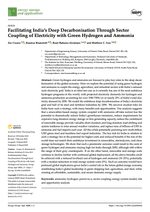Nature Climate Change
View Journal Article / Working PaperInvestors will play a major role, whether active or passive, in climate change mitigation. To enable prudent decision-making, we propose three physically based engagement principles that could be used to assess whether an investment is consistent with a long-term climate goal.
Apartheid in South Africa gave investors moral headaches in the 1970s. Should they continue to invest in South Africa or should they divest, sending a signal about the illegitimacy of the apartheid regime? In response to this conundrum, a set of simple principles was advanced in 1977. The Sullivan Principles provided guidelines for investment in morally acceptable companies. Investors complying with the guidance did not reduce returns — if anything returns were higher — and the principles served as an important symbolic gesture against the legitimacy of the apartheid government.
Climate change is creating similar moral headaches today. Should investors continue to invest in fossil fuels or should they divest, sending a signal about the perceived illegitimacy of particular business models in a changing climate? Further, given the internationally agreed aspiration towards achieving net-zero emissions in the second half of the century, how should investors manage the legal and financial risks of this transition ?
Investment principles such as the Sullivan Principles, and those outlined in this paper, can be useful if they help inform stakeholders at many levels, both serving as a corporate code of conduct for companies themselves, and providing investment guidance for asset managers and owners. For principles to have value in helping drive the transitions needed to stabilize climate they must do more than notionally acknowledge climate as a concern; they must have a demonstrable impact on corporate decision-making.




